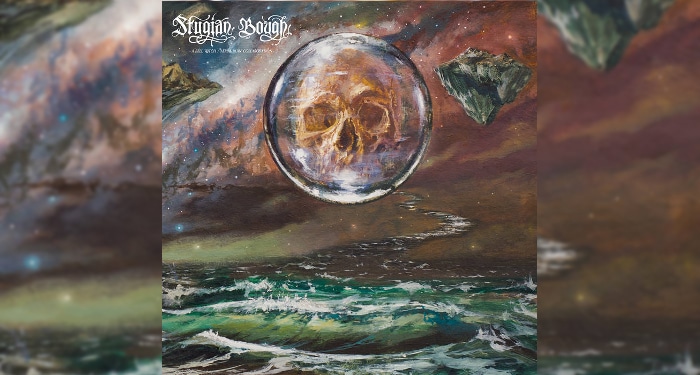Review: Bell Witch & Aerial Ruin – Stygian Bough

Misery loves company.
The loss of a friend brings survivors together. Sometimes to cast blame, sometimes to beg forgiveness, but more important is the reunion of contacts who had perhaps been at a distance before. If 2017’s Mirror Reaper was Bell Witch‘s grand farewell to a fallen friend, perhaps Stygian Bough is the aftermath where displaced associates mingle to fill the gap, and make resolutions not to drift apart in light of a recent reminder of fleeting life. It’s a bit difficult to place the artistic aim of Stygian Bough, so I’ll say the most important thing it does is bring a longtime acquaintance fully into the fold, to see where the new kinship might lead.
Erik Moggridge of Aerial Ruin has always been a spectral presence in the Bell Witch project, lending his voice to a track in each of their long-players thus far. This consistent collaboration makes him something more than just a guest player, even if he has reserved his instrumental talents from the proceedings until now. It’s almost a perfect reflection of the minimalism that is the guiding animus of Bell Witch that he has always sung his piece, then retreated away again into the folds of softly threaded funeral doom. A band doing this much with so little might take pride in calling on truly clean, melodic vocals only once per grand composition, and only after half a record’s worth of contemplative stage-setting.
So it may be a surprise to realize how busy Stygian Bough can get, in terms of overlapping instrumentation. On top of the ponderous drums and bass, there is the constant accompaniment of Erik’s mewling vocals, and for the first time in a Bell Witch release, guitar, as well as piano strikes and echoing organ, sometimes all at once. Given the pace and repetition, there is ample time to digest each flavor, to focus on their impacts individually and collectively, and the usual effect is to take Bell Witch’s preferred backdrop from soundscape to sound ecosystem. Between the guitar and bass, every combination of drones, melodies, rhythmic waves, and even true leads is explored, tempered and washed over by the sparse but chilling drums, and threaded together with reverent, resigned singing. Even the oscillation of the organ gets used as a dramatic buildup in the break to “The Unbodied Air”.
There’s a rich interplay between all these new elements, and Moggridge’s contributions never interrupt or draw too much attention from the delicate dirge of Dylan Desmond or the satin cymbals of Jesse Shreibman. At times, like near the end of “Heaven Torn Low II”, the tandem effect is like an entire body, inhaling and exhaling serenely, an escaping shudder of guitar over bated breaths of bass. Album opener “The Bastard Wind” makes good on its title, strings and reverberating vocals propelled to and fro by the drums, left to hang and settle like leaves caught in a zephyr, before being picked up again and launched into a mournful harmonized solo.
This also means the biggest departure of Bough from previous outings is that there is less use of true silence, the sort of sustained emptiness between chords that makes even the monstrous bass seem positively miniscule and thus underscore the sheer size of the sonic canvas even more. In exchange, the dainty guitar refrains fill a similar role, acting as a sharp, defined focus against the endless waves of warm bass, as in the central passage of “The Unbodied Air”. Moggridge deploys his guitar like a painter using sharp brush strokes to draw and direct the eye over a canvas awash with subtly blended clouds of color. For Bell Witch, less may be more, but that doesn’t mean that more is necessarily less.
While billed as a collaboration between two bands, with both names printed on the cover, their shared history leads me to think Stygian Bough might be a moment of unification for the two. This is only Volume I, after all. Bell Witch’s signature has always been an underlying brightness in otherwise dismal arrangements, a promise of finite woes outweighed by an infinite, outstretched peace yet to come. Sometimes the slow march towards the inevitable end is resplendent and relieving. The netherworld river has many branches, and you’ll have nothing but time to explore.







